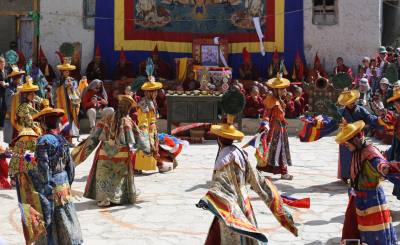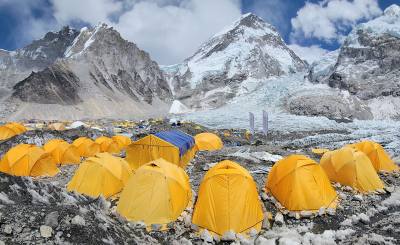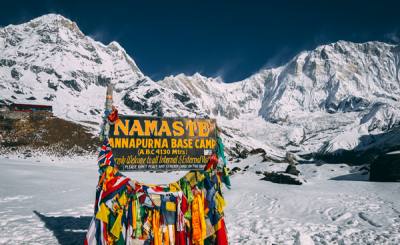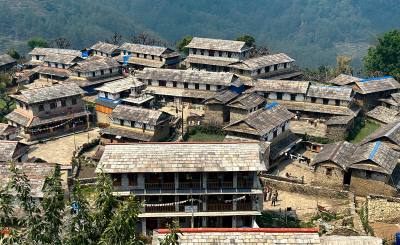- info@shikharadventure.com Get Travel Expert Advise
- +977 9841869254 (Dambar) Viber & Whatsapp
Nepal Bans Solo Trekking, Except in Everest Region From Arpril 1, 2023
Nepal has long been a popular destination for trekkers looking to experience the majestic Himalayas as well as the country's distinct culture and traditions. However, as of April 1, 2023, Nepal has implemented new regulations that make it illegal for tourists to trek alone and require them to hire local guides.
The Tourism Board of Nepal made the decision to make guides mandatory for trekkers except for Everest Region in order to improve tourist safety and security while also promoting the country's tourism industry. The new regulations were implemented in response to a number of incidents in recent years in which tourists went missing or were involved in accidents while trekking alone.
Tourists will not be allowed to trek independently in Nepal's mountainous regions, being Everest Region an exception under the new rules. They must instead hire a licensed trekking guide from a registered trekking company. The guide will be in charge of ensuring the trekker's safety and security, as well as providing information about the local culture, customs, and environment.
Tourists will also need to obtain a government trekking permit, which can be obtained through the Trekking Agencies' Association of Nepal (TAAN) or the Nepal Tourism Board (NTB). Trekkers will be required to provide information about their itinerary, the trekking route they intend to take, and the name of their guide.
While the new regulations may appear to be restrictive, they are intended to improve tourist safety and security while also providing economic benefits to the local community. The regulations will provide employment opportunities for locals while also ensuring that the tourism industry benefits the larger community by requiring tourists to hire local guides.
Furthermore, the new regulations will ensure that trekkers are provided with accurate and up-to-date information about the local environment and cultural practices. This will aid in the promotion of responsible tourism and the preservation of local customs and traditions.
It should be noted that the new regulations were enacted in response to an increasing number of incidents involving independent trekkers. There have been several incidents in recent years where tourists have gone missing or been involved in accidents while trekking alone. The government hopes that by requiring tourists to hire local guides, it will reduce the number of incidents and ensure that tourists have a safe and memorable trekking experience.
In conclusion, Nepal's decision to make guides mandatory for trekkers is a positive step towards enhancing the safety and security of tourists while also promoting responsible tourism. By requiring tourists to hire local guides, the government is providing economic benefits to the local community while also ensuring that tourists receive accurate information about the local environment and cultural practices. While the new regulations may take some getting used to, they are ultimately designed to enhance the trekking experience for tourists while also ensuring that the tourism industry benefits the wider community.
Recent Post

Dashain Festival - The Most Celebrated Nepalese Holiday
Others
Exploring the Enchanting Mustang Valley: A Must-Visit Destination in 2023
Trekking
International Mt. Everest Day | 70 years of Amazing Accomplishments
Others
Nepal: A Melting Pot of Culture, Tradition, and Hospitality
Others
Annapurna Trek Guide: A Majestic Himalayan Adventure to Remember
Trekking
Ghandruk - A Cultural and Natural Heaven in the Annapurna Range
Trekking
Related Blog(s)
- Exploring the Enchanting Mustang Valley: A Must-Visit Destination in 2023
- Annapurna Trek Guide: A Majestic Himalayan Adventure to Remember
- Ghandruk - A Cultural and Natural Heaven in the Annapurna Range
- Surviving the Everest Base Camp Trek: Overcoming the Challenges of Altitude and Weather
- China adds Nepal in top tourist destinations for its citizen
- Top 10 Best Treks in Nepal
- Mardi Himal Trek: A Hidden Gem in the Annapurna Region
- A Dream place for homies and outsider: Upper Mustang, Nepal
- Manaslu Circuit Trek V/S Everest Base Camp Trek
- Trip of a Lifetime
- Free Trip in Nepal
- 20 REASON TO VISIT NEPAL 2023
- Aware with altitude sickness.
- How to hire a guide in Nepal???
- Aware with altitude sickness.
- Best seven selling trekking in Nepal
- Top 7 food you can't miss when you travelling in Nepal
- Rara Lake Trek
- The best five view point in Nepal
- TOP 10 REASONS TO VISIT NEPAL
- Top Five Popular Trekking destination in Nepal


